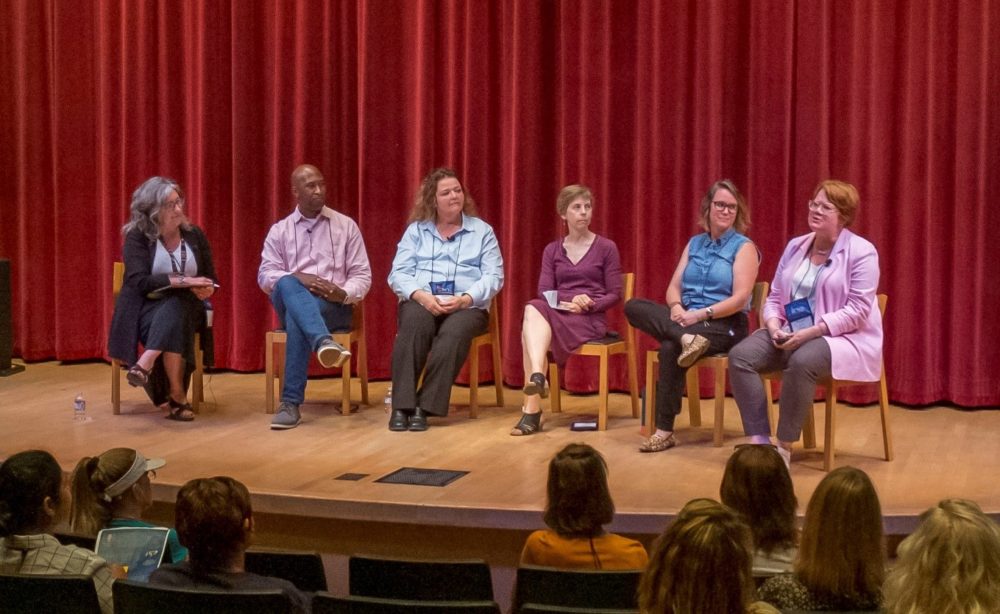By Chasiri Sherron. “Change happens by incorporating diverse perspectives,” said Ann Kovalchick, UC Merced chief information officer (CIO), when introducing the 2019 UCTech Conference Diversity/WIT Panel, “Reframing Technical Difficulties – Expertise, Inclusivity, and How Work Gets Done in IT.”
The Tuesday session was a part of the UC IT community’s annual systemwide tech conference, held July 15 – 17 at UC Santa Barbara. UCLA Humanities CIO Annelie Rugg served on a systemwide committee that planned this year’s panel session. She said, “Standing room only at the 2018 Women in Tech panel at UC Davis showed us that there is grassroots interest in the topic of diversifying IT, and a real desire to confront the challenges and work together to shape a better reality.” This year, six professionals, Kovalchick included, gathered on stage to continue the conversation.
All panelists mentioned the rapidly changing face of the tech industry. UC Santa Cruz CIO Van Williams and UC Davis Associate CIO Meggan Levitt both suggested that the boundaries have expanded in terms of what are considered “technical” jobs or companies. Newer, less-conventional routes into technical careers are making room for a more diverse range of players to enter the game.
CITRIS Deputy Director Camille Crittenden’s quick survey of the audience further proved their point: When asked about their educational backgrounds, a very small of people in the room raised their hands to indicate a degree in computer science or engineering. What were the majority? Humanities majors. Palmer Gibbs, a program manager for Amazon, studied journalism, and she reminded the room that having a technical background is not necessary for gaining technical skills.
For organizations, the key to tapping this wider applicant pool is to improve implicit bias awareness in the hiring process and beyond. Michele Haynes, a senior IT recruiter at UC Irvine, recommended practices such as increased collaboration between recruiters and HR departments, or reframing application reviews and interview processes: An applicant’s name or address can trigger biases that may overshadow work experience or qualifications, but they can easily be blurred out or removed before review by the hiring team. Interviews can include exercises that allow applicants a chance to demonstrate how they think or how they respond to situations.
And what about those who are already in the workforce? The bottom line is employers should strive to create a company culture that affords employees ample chances to give their honest input, while following up with actions that prove that input is being heard. Crittenden believes that stagnation and poor retention impact women and minority groups the most because their work is more likely to go unnoticed – a common occurrence in tech fields where many leadership roles are still dominated by the white male demographic.
The most pressing advice given to the employees themselves was to find mentors, sponsors, and allies in the workplace. Williams said this is crucial for initiating opportunities for growth because it enables workers to make their career paths material and visible to others and provides an outlet for decision support. Gibbs suggested that finding allies can help you be heard in circumstances where you may not be given enough space to speak up.
In a follow-up statement, Kovalchick reiterated that such “consistent, intentional, and reflective action[s]… create organizations able to effectively respond to the emergent change that characterizes the role of information technology in today’s workplace.” In order to capitalize on employee potential and break down barriers put in place by previously established cultural norms within the industry, meaningful opportunities must be provided to all.
The last of the panelists’ comments urged audience members to push themselves, such as by asking more “Why not?” questions, and taking stretch assignments that make you look and feel ready to lead. Risk taking helps to combat imposter syndrome and takes you in new directions.
As Levitt said, “If you’re thinking about advancing your career remember – it’s not a ladder, it’s a jungle gym.” You can always try something new and come back if you don’t like it.
2019 Diversity/WIT Panel Coordinating Committee: Shirley Bittlingmeier, UC Office of the President; Shohreh Bozorgmehri, UC Irvine; Lisa Klock, UC Santa Barbara; Ann Kovalchick, UC Merced; Annelie Rugg, UCLA; Chioma Ndubuisi, UC Merced; and Yvonne Tevis, UC Office of the President.
 Chasiri Sherron is a UC Berkeley student and an IT marketing and communications intern, Information Technology Services, UC Office of the President.
Chasiri Sherron is a UC Berkeley student and an IT marketing and communications intern, Information Technology Services, UC Office of the President.


Thanks for the post. “Newer, less-conventional routes into technical careers making room for a more diverse range of players to enter the game.” was insightful. That also makes me question why the reverse is not true. Meaning why not make room for techies to try out non-technical roles?